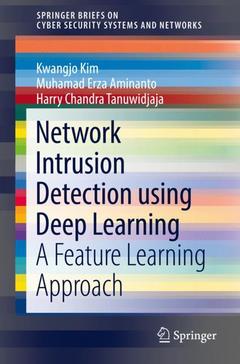Network Intrusion Detection using Deep Learning, 1st ed. 2018 A Feature Learning Approach SpringerBriefs on Cyber Security Systems and Networks Series
Auteurs : Kim Kwangjo, Aminanto Muhamad Erza, Tanuwidjaja Harry Chandra

This book presents recent advances in intrusion detection systems (IDSs) using state-of-the-art deep learning methods. It also provides a systematic overview of classical machine learning and the latest developments in deep learning. In particular, it discusses deep learning applications in IDSs in different classes: generative, discriminative, and adversarial networks. Moreover, it compares various deep learning-based IDSs based on benchmarking datasets. The book also proposes two novel feature learning models: deep feature extraction and selection (D-FES) and fully unsupervised IDS. Further challenges and research directions are presented at the end of the book.
Offering a comprehensive overview of deep learning-based IDS, the book is a valuable reerence resource for undergraduate and graduate students, as well as researchers and practitioners interested in deep learning and intrusion detection. Further, the comparison of various deep-learning applications helps readers gain a basic understanding of machine learning, and inspires applications in IDS and other related areas in cybersecurity.
Kwangjo Kim is a Fellow of the International Association for Cryptologic Research (IACR). He received B.Sc. and M.Sc. degrees in Electronic Engineering from Yonsei University, Seoul, Korea, in 1980 and 1983, respectively, and a Ph.D. from the Division of Electrical and Computer Engineering, Yokohama National University, Japan, in 1991. He was a Visiting Professor at the MIT and the UC at San Diego USA, in 2005 and the Khalifa University of Science, Technology and Research, Abu Dhabi, UAE, in 2012 and an Education Specialist at the Bandung Institute of Technology, Bandung, Indonesia, in 2013. He is currently a Full Professor at the School of Computing and Graduate School of Information Security, Korea Advanced Institute of Science and Technology, Daejeon, the Korean representative to IFIP TC-11 and the honorary President of the Korea Institute of Information Security and Cryptography (KIISC). His current research interests include the theory and practices of cryptology and information security. Prof. Kim served as a Board Member of the IACR from 2000 to 2004, Chairperson of the Asiacrypt Steering Committee from 2005 to 2008 and President of KIISC in 2009. He is also a member of IEICE, IEEE, ACM and KIISC.
Muhamad Erza Aminanto received B.S. and M.S. degrees in Electrical Engineering from Bandung Institute of Technology (ITB), Indonesia in 2013 and 2014, respectively. He is pursuing his Ph.D in the School of Computing at Korea Advanced Institute of Science and Technology (KAIST), South Korea. His current research interests include machine-learning, intrusion detection systems and big data analytics. His recent work entitled "Deep Abstraction and Weighted Feature Selection for Wi-Fi Impersonation Detection” was published with Kwangjo Kim in IEEE Transactions of Information Forensics and Security (IF:4.332) in 2017.
Harry Chandra Tanuwidajaja received B.S. and M.S. degrees in Electrical Engineering from the Bandung Instit
Surveys deep learning-based IDSs
Suggests future directions for IDS research
Describes how to apply deep learning in IDS
Discusses learning for better attack detection
Date de parution : 10-2018
Ouvrage de 79 p.
15.5x23.5 cm
Disponible chez l'éditeur (délai d'approvisionnement : 15 jours).
Prix indicatif 63,29 €
Ajouter au panier


